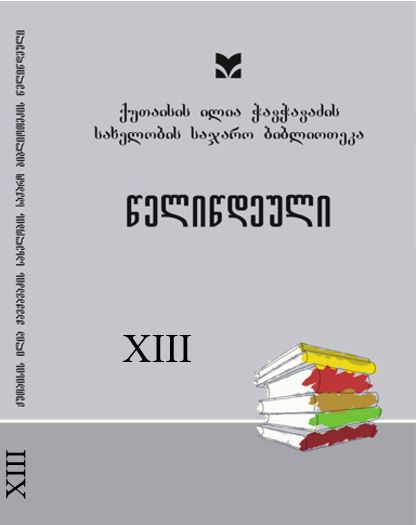ერთი თემის პერსონაჟი სხვადასხვა მხატვრული ტექსტის რაკურსში
(გიორგი ერისთავი, ბარბარე ჯორჯაძე, ილია ჭავჭავაძე)
DOI:
https://doi.org/10.48614/yk.13.2021.29-33საკვანძო სიტყვები:
ქართული პოეზია, გიორგი ერისთავი, ბარბარე ჯორჯაძე, ილია ჭავჭავაძეანოტაცია
From the 50s of the XIX century in Georgian poetry appears the face of an old monk sitting on the Caucasus Mountain, is talking to the author. The conversation is mainly about the fate of the homeland and the questions to the elderly concern his prediction of the future of the country. Poet and playwright Giorgi Eristavi (1811- 1864) - This theme was developed in the poem „Caucasus and Ukhans“ written in 1854 (in the manuscript he is called „The Caucasus and the Unknown“), woman writer and public figure, Barbare Jorjadze (1833-1895) In the poem „Ghost“, the sixty-year-old writer and public figure, Ilia Chavchavadze - in the poem „Ghost“ created in St. Petersburg (published in 1859 in the magazine „Tsiskari“).
The present article presents a comparative typological study (we have not found such material in literary thought) by presenting the intentions of all three writers in these three works, which intersect with the writers considering the fate of the country, regardless of their affiliation with different literary directions and ideologies.
Therefore, if we determine the approximate time of writing the „ghost“, it must be written either before 1859, from 1859 to 1881, or from 1881 to 1895. Some assumptions completely rule out the influence of Ilia’s poem and lean more towards Giorgi Eristavi’s verse.
If we expand all the above, it seems that the poet’s creative laboratory, Barbare Jorjadze, has no influence on the creative laboratory. It is the transmutation of perception, the perception of one’s own ideological world, and the emergence of new creatures. That is why Barbare Jorjadze’s „Ghost“ does not look like either Giorgi Eristavi’s poem or Ilia’s poem, but appears as an independent work, dictated by a deep patriotic feeling.




